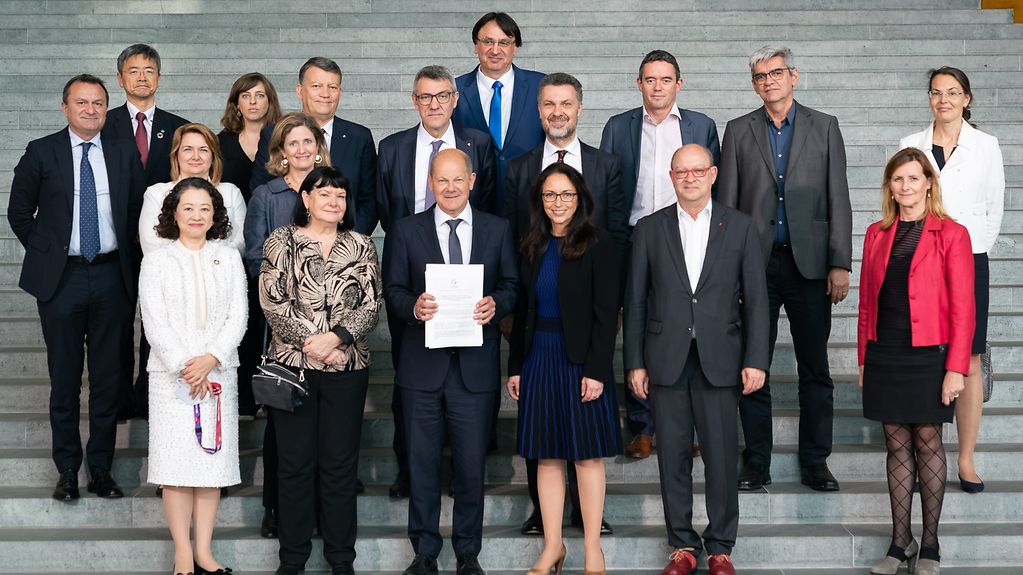Labour7 hands over recommendations
Federal Chancellor Scholz sees the world economy as “facing the greatest transition since the Industrial Revolution”. On Wednesday, he received the representatives of Labour7 in the Chancellery. The guests handed him their recommendations and proposals for a socially just transformation of the economy and working world.
2 min reading time

Federal Chancellor Scholz with the representatives of Labour7 in Berlin.
Photo: Federal Government/Kugler
On Wednesday, Federal Chancellor Scholz received the representatives of Labour7 in the Chancellery to discuss the challenges and opportunities of a rapidly changing working world. The guests handed him their recommendations and proposals for a socially just transformation.
Scholz said that the resilience of social protection systems also meant “securing the rights of employees along the global supply and value creation chain”. With these words, the Federal Chancellor referred to the meeting of G7 experts the previous week. In Berlin, representatives of the G7 states, international organisations, trade unions and employers and civil society had discussed steps towards globally binding standards for sustainable supply chains.
Labour7 (L7) is one of seven Engagement Groups. The L7 campaigns for the rights and interests of working people. The group stands for the dialogue between the G7 and the trade unions of G7 members and their leading associations, together with international trade union organisations.
Preserving social cohesion – protecting workers’ rights
Scholz said that the Russian invasion of Ukraine had had drastic effects on the transformation of the economy and had accelerated changes in the working world,
but that this situation did not give us the right to neglect cross-generational challenges such as climate and health crises. Scholz declared: “Universal and lasting peace can only be created on the basis of social justice” – a statement from the constitution of the International Labour Organisation (ILO).
Scholz stated that, for the national economies of the G7, the transition to a carbon-neutral global economy would be “the greatest transition since the Industrial Revolution”.
The Federal Chancellor made an appeal: “We must preserve the social fabric which holds our societies together.” He added that the G7 must simultaneously enable a just transition at the global level, too. No one should be left behind on the way to a climate-neutral and climate-resistant future. The social protection systems played a decisive role here, he said..
“Progress towards an equitable world” is the aim and aspiration of the German G7 Presidency. Scholz stressed that, for politicians, an exchange of views with civil society was particularly important, because this goal could only be achieved “if we work together – within the G7 and beyond it.”
He added that the voice of trade unions was also significant in current discussions about how to deal with globally imminent energy and food scarcity, interrupted supply chains, the influx of refugees, the continuing COVID-19 pandemic and rising energy prices in order to find the right answers for key questions.
Germany has held the G7 Presidency since 1 January 2022. “Progress towards an equitable world” – this is the goal the German G7 Presidency has set itself for its programme. It will culminate in the summit of the G7 heads of state and government held at Schloss Elmau from 26 to 28 June.